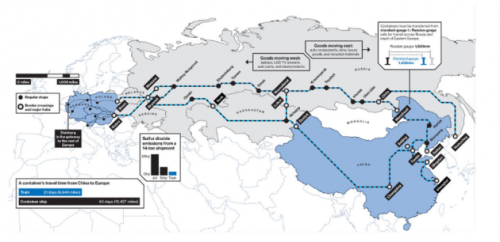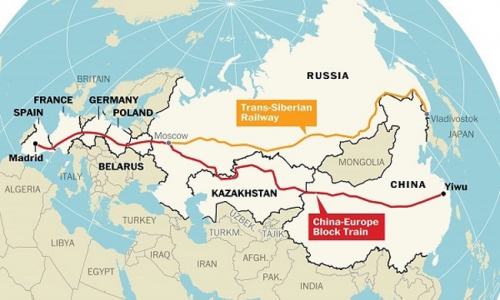dimanche, 22 mars 2015
Europe also pivots – to China

Europe also pivots – to China
The decision by Britain to seek admission to the Asian Infrastructure Investment Bank [AIIB] as a founding member apparently took Washington by surprise. The State Department spokesperson admitted that there was “virtually no consultation with the US” and that it was “a sovereign decision made by the United Kingdom.” In the coming weeks, it is going to be even harder for the US to reconcile with Australia following Britain’s footsteps, since President Barack Obama had personally intervened with Prime Minister Tony Abbott last October not to do any such thing. South Korea and France too are likely to join the AIIB. (Guardian)
Britain maintains that the decision was taken in the “national interest” and that the underlying considerations are purely economic. But, surely, Britain cannot but be aware that the AIIB is a dagger aimed at the heart of the Bretton Woods system. Worse still, China practically aims to enter the Bretton Woods system as a presiding deity. As a commentary by Xinhua put it,
“Rising to become the second largest economy in the world, China is advocating and working on revising the current international system… China has no intention of knocking over the chessboard, but rather in trying to help shape a more diverse world playing board… China wishes to see its currency included in the IMF basket in accordance with the weight the yuan now exerts on international goods and services trade. China welcomes cooperation from every corner of the world to achieve shared prosperity based on common interest, but will go ahead anyway when it believes it is in the right.”
The European countries understand that the AIIB provides an essential underpinning for China’s Silk Road strategy (known as the ‘Belt and Road’ initiatives). The former French prime minister Dominique de Villepin wrote recently in the French business daily Les Echos that China’s Silk Road offered France and other European countries opportunities to harness lucrative agreements in the transport sector and urban services. “It is a task that should mobilize the European Union and its Member States, but also local authorities, chambers of commerce, and businesses, not to mention universities and think tanks,” De Villepin suggested.
Do the European minds fail to comprehend the geopolitics? Of course, they perfectly well understand. To quote De Villepin, in diplomatic terms, the Silk Road is “a political vision which paves the way to European countries to renew dialogue with partners on the Asian continent which could help to find, for instance, flexible projects between Europe and Russia, in particular, to find [the funds] necessary for the stabilization of Ukraine. The thread between the East and West has yet to take hold.”
Russia too has grasped the strategic significance of China’s Silk Road. Moscow has reportedly drafted a 10-year strategy for the Shanghai Cooperation Organization to be taken up at the forthcoming summit of the body in July in Ufa, which, according to the current SCO secretary general (a Russian diplomat, by the way), “will be the SCO’s proclamation for deeper and wider participation in global affairs”, combining the national economic strategies of SCO member countries with China’s Silk Road project.
To be sure, the US’ European allies Britain, France and Germany are finding their own pathways to China (and Russia). Britain’s trade volume with China has touched $70 billion and the Chinese investments in the past 3-year period have exceeded the entire amount invested until then.
As De Villepin put it eloquently in his article, haunted by volatile financial markets and economic woes, and challenged by security threats, France and its European partners have to join China’s efforts to re-build the Silk Road. De Villepin acknowledged that China’s Silk Road strategy is crafted to suit China’s interests as it offers “a flexible framework to meet the major challenges facing the country,” including the globalization of the Asian powerhouse’s domestic economy and strengthening the global role of its currency in world trade, and, domestically, to re-balance the provinces’ development and household consumption as well.
Nonetheless, Europe doesn’t see it in zero sum terms, because the fresh approach to economic development and the proposed diplomatic boost would “fill the void” between Asia and Europe by creating a link between the nations’ infrastructure, financial, and communication industries. “It is an economic vision which adapts Chinese planning to international economic cooperation. In a volatile and unstable financial world, it is necessary to take the right approach to long-term projects using new multilateral tools,” De Villepin wrote.
Germany sees things the same way as Britain and France. Chancellor Angela Merkel said yesterday at the inaugural of the Hanover Fair that German economy views China not only as the most important trading partner outside Europe, but also as a partner in the development of complex technologies. China is the official partner country of CeBIT 2015. Merkel welcomed Chinese companies coming to CeBIT 2015, saying they embody innovation and China’s role as partner country of the fair is an essential component of China-Germany innovation cooperation.
The Obama administration is missing the plot. How could this happen to a cerebral president — getting marooned in Mesopotamia in an indeterminate war and in Eurasia in chasing objectives that by no means directly impact the US’ vital interests — while such a momentous reconfiguration of the Asian Drama is unfolding right under his nose?
Beijing has knocked the bottom out of the US’s ‘pivot’ strategy to contain China — not only in intellectual terms but also in political and diplomatic terms. Beijing plans to unveil the implementation plan for ‘Belt and Road’ shortly at the 2015 Boao Forum later this month. Sources in Beijing told Xinhua that “hundreds” of infrastructure projects are being identified.

00:05 Publié dans Actualité, Affaires européennes, Eurasisme, Géopolitique | Lien permanent | Commentaires (0) | Tags : politique internationale, géopolitique, europe, actualité, affaires européennes, union européenne, chine, russie, asie, affaires asiatiques |  |
|  del.icio.us |
del.icio.us |  |
|  Digg |
Digg | ![]() Facebook
Facebook



Les commentaires sont fermés.